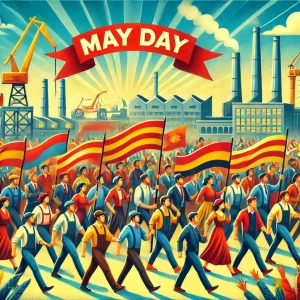Public Holidays
 Public Holiday, Religious Holidays
Public Holiday, Religious Holidays Article ContentsWhat is JanmashtamiThe Significance of JanmashtamiHow Janmashtami is CelebratedRegional Variations in Janmashtami CelebrationsSpiritual Lessons from JanmashtamiFrequently Asked Questions (FAQs) About Janmashtami What is Janmashtami Janmashtami, also known as Krishna
 Cultural Holiday, Public Holiday
Cultural Holiday, Public Holiday Article ContentsOrigins of International Mother Language DayThe Importance of Linguistic DiversityHow to Celebrate International Mother Language DayHow does technology help in preserving languages?Challenges and the Way ForwardConclusionFrequently Asked Questions (FAQs)
 Public Holiday
Public Holiday Victory Day of Bangladesh, celebrated annually on December 16, is one of the most significant national holidays in the country. It marks the end of the Bangladesh Liberation War in
 Cultural Holiday, Public Holiday
Cultural Holiday, Public Holiday Pohela Boishakh, the first day of the Bengali calendar, is one of the most significant cultural festivals in Bangladesh and among Bengali communities worldwide. It marks the beginning of a
 Public Holiday
Public Holiday May Day, also known as International Workers’ Day, is observed on May 1st each year in many countries worldwide. It is a day dedicated to the recognition of workers’ rights,
Key National Holidays in Bangladesh include:
Bangladesh has several important National Holidays, deeply connected to the country’s history, culture, and politics. These holidays are widely observed, often with official ceremonies, cultural programs, and national celebrations.
1. International Mother Language Day
📅 Date: February 21
📌 Significance: Honoring the martyrs of the Bengali Language Movement
📜 On February 21, 1952, students protesting for the recognition of Bengali as an official language were shot and killed by Pakistani authorities. This movement eventually led to Bengali being recognized as an official language in 1956. In 1999, UNESCO declared this day International Mother Language Day to promote linguistic and cultural diversity worldwide.
🔹 How It Is Observed:
- People visit the Shaheed Minar (Martyrs’ Monument) to lay flowers.
- The national flag is flown at half-mast.
- Special programs, discussions, and cultural events are held in schools and on television.
2. Independence Day of Bangladesh
📅 Date: March 26
📌 Significance: Marks Bangladesh’s declaration of independence from Pakistan
📜 On March 26, 1971, Bangladesh (then East Pakistan) officially declared independence from Pakistan, starting the Liberation War, which lasted for nine months. After a bloody conflict, Bangladesh gained full independence on December 16, 1971.
🔹 How It Is Celebrated:
- The President and Prime Minister lay wreaths at the National Martyrs’ Memorial.
- A grand parade is held in the capital, Dhaka.
- Cultural programs, concerts, and patriotic events take place nationwide.
- Special TV broadcasts and documentaries highlight the history of the Liberation War.
3. Bengali New Year (Pohela Boishakh)
📅 Date: April 14
📌 Significance: Celebrates the first day of the Bengali calendar
📜 Pohela Boishakh marks the beginning of the Bengali New Year, traditionally linked to agricultural cycles. It is celebrated with colorful festivals, cultural programs, and fairs throughout Bangladesh.
🔹 How It Is Celebrated:
- Mangal Shobhajatra: A vibrant cultural procession organized by Dhaka University, recognized as an Intangible Cultural Heritage by UNESCO.
- People wear traditional attire: Men wear Panjabi, and women wear red and white sarees.
- Traditional food includes Panta Bhat (fermented rice), fried hilsa fish, and lentils.
- Folk music, dance performances, and street fairs take place nationwide.
4. May Day (International Workers’ Day)
📅 Date: May 1
📌 Significance: Recognizing workers’ rights and contributions
📜 May Day, also known as International Workers’ Day, is celebrated globally to honor labor movements and workers’ struggles for fair wages and working conditions.
🔹 How It Is Observed:
- Workers’ rallies and parades are held across Bangladesh.
- Labor unions and government officials deliver speeches about workers’ rights.
- Special programs on TV and radio focus on labor issues.
5. National Mourning Day
📅 Date: August 15
📌 Significance: Commemorates the assassination of Sheikh Mujibur Rahman
📜 On August 15, 1975, Sheikh Mujibur Rahman, the founding father of Bangladesh, was assassinated along with most of his family members. This day is observed to honor his legacy and the sacrifices he made for the country’s independence.
🔹 How It Is Observed:
- National flags are flown at half-mast.
- Special prayers and discussions about Sheikh Mujib’s contributions take place.
- Documentaries and programs are aired on television.
6. Victory Day (Bijoy Dibosh)
📅 Date: December 16
📌 Significance: Celebrates Bangladesh’s victory in the Liberation War
📜 On December 16, 1971, Pakistani forces surrendered to the Bangladesh-India joint forces, officially ending the war and securing Bangladesh’s independence. This is one of the most important national holidays in the country.
🔹 How It Is Celebrated:
- A grand military parade is held in Dhaka.
- Schools and institutions organize patriotic programs and debates.
- The national flag is hoisted on all government and private buildings.
- Fireworks, concerts, and cultural performances take place.
7. Christmas Day
📅 Date: December 25
📌 Significance: Celebrating the birth of Jesus Christ
📜 Though Bangladesh is a Muslim-majority country, Christmas (or “Boro Din” in Bengali) is a public holiday, celebrated mainly by the Christian community.
🔹 How It Is Celebrated:
- Special church services and prayers are held.
- Families gather for festive meals and exchange gifts.
